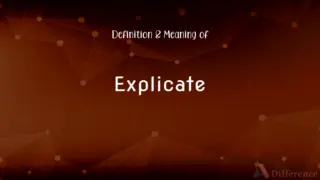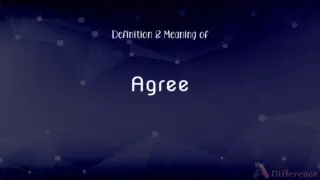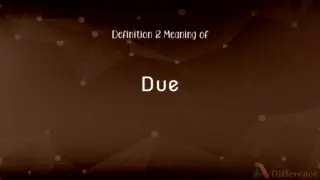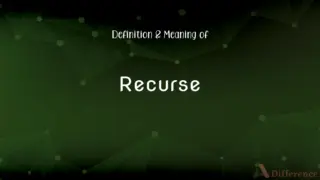Organise Definition and Meaning
By Tayyaba Rehman & Urooj Arif — Updated on February 29, 2024
"Organise" means to arrange or put in order, systematically planning and coordinating components or activities. e.g., She decided to organise her desk to improve efficiency.

Table of Contents
Organise Definitions
Organise means to arrange systematically for efficiency or order.
He needed to organise his notes before the meeting.
Organise involves planning events or activities methodically.
She volunteered to organise the school fundraiser.
Organise means to establish a structured pattern or sequence.
They needed to organise their study timetable efficiently.
Organise means to coordinate tasks or people effectively.
He was chosen to organise the team's schedule.
Organise signifies managing or arranging with a specific purpose.
She helped organise the documents for easy access.
Organise implies creating order from chaos or clutter.
She decided to organise her closet during the weekend.
Organise entails setting up or preparing something systematically.
They had to organise the conference room for the event.
Organise involves devising and implementing a plan or system.
He organised a carpool system for the neighborhood.
Organise refers to the act of creating an orderly structure.
She loved to organise community events in her town.
(British spelling) organize
Same as organize.
Bring order and organization to;
Can you help me organize my files?
Create (as an entity);
Social groups form everywhere
They formed a company
Form or join a union;
The autoworkers decided to unionize
Cause to be structured or ordered or operating according to some principle or idea
Arrange by systematic planning and united effort;
Machinate a plot
Organize a strike
Devise a plan to take over the director's office
Plan and direct (a complex undertaking);
He masterminded the robbery
Organise refers to bringing together elements in a structured manner.
They helped organise the library books by genre.
Organise Snonyms
Structure
To arrange or organize according to a plan or system.
The curriculum was structured to cover all necessary topics.
Plan
To decide on and arrange in advance.
They planned their vacation down to the last detail.
Coordinate
To bring the different elements of (a complex activity or organization) into a relationship that will ensure efficiency or harmony.
He coordinated the event without any hitches.
Marshal
To arrange or assemble (a group of people, especially soldiers) in order.
The troops were marshaled into formation.
Systematize
To arrange according to an organized system; make systematic.
The librarian systematized the books by genre.
Manage
To be in charge of; administer or regulate.
He managed the project efficiently.
Prepare
To make ready or able beforehand for a specific purpose, as for an event or occasion.
She prepared the report a week in advance.
Arrange
To put things in a neat, attractive, or required order.
She arranged the flowers beautifully.
Schedule
To arrange or plan for something to take place at a particular time.
The meeting was scheduled for 9 AM.
Mobilize
To organize or prepare something, such as a group of people, for a purpose.
The community mobilized to support the local charity.
Organise Idioms & Phrases
Organise the deck
To arrange things in a structured and orderly manner.
She had to organise the deck of her responsibilities to focus on the most urgent tasks.
Organise from the ground up
To start organising something from the very beginning.
He had to organise the project from the ground up to ensure all bases were covered.
Organise your thoughts
To arrange or clarify one's thinking process.
Before the meeting, he took a moment to organise his thoughts.
Organise like clockwork
To arrange or manage something very efficiently and smoothly.
The event was organised like clockwork, with every detail carefully planned.
Organise with precision
To arrange something in a very careful and exact manner.
The scientist organised the experiment with precision to ensure accurate results.
Organise the troops
To get a group of people ready and arranged for action or a task.
Before the big launch, the manager had to organise the troops.
Organise the chaos
To bring order to a very disordered or confusing situation.
It was her job to organise the chaos of the busy office.
Time to organise
A moment designated for arranging or structuring things or activities.
Every morning, she allocated a time to organise her schedule for the day.
In organise mode
Being in a state of actively arranging or structuring things.
Once she's in organise mode, there's no stopping her efficiency.
A well-organised mind
Having a mental state that is efficiently structured and arranged.
He attributed his success to having a well-organised mind.
Organise your space
To arrange or tidy up one's physical surroundings.
She found it easier to concentrate after she took the time to organise her space.
Organise the agenda
To arrange or plan the items or topics to be discussed in a meeting.
Before the conference, it was her responsibility to organise the agenda.
Organise a plan
To devise or arrange a strategy or course of action.
They had to organise a plan quickly to deal with the unexpected changes.
Organise for success
To arrange or prepare things in a way that increases the likelihood of achieving success.
He believed that to win the tournament, they needed to organise for success.
Organise the ranks
To put a group in order, especially in a hierarchical or structured manner.
The new leader had to organise the ranks to restore discipline.
Organise the puzzle
To put together or arrange the pieces of a complex situation.
Solving the case required the detective to organise the puzzle of clues.
Organise a response
To prepare or arrange a reaction or reply, especially in a coordinated way.
The team needed to organise a response to the client's feedback.
Organise the lineup
To arrange the order or sequence of participants or elements in an event.
The concert coordinator had to organise the lineup of performers.
Organise the pieces
To assemble various elements of a situation or problem to understand the whole picture.
To understand the market trends, the analyst needed to organise the pieces of data.
Organise your priorities
To arrange one's tasks or goals in order of importance.
With so many tasks at hand, it was essential to organise your priorities.
Organise Example Sentences
She had to organise the kitchen after the big meal.
She showed great skill in how she would organise the project.
The teacher asked us to organise our ideas for the essay.
He decided to organise a surprise party for his friend.
They worked together to organise the charity concert.
He had a plan to organise the files on his computer.
She found it relaxing to organise her bookshelf by color.
She helped her little brother organise his school supplies.
He loved to organise games for the family gatherings.
They needed to organise their trip itinerary carefully.
He took the initiative to organise a neighborhood cleanup.
She encouraged her students to organise their thoughts before speaking.
They had a meeting to organise the club's annual events.
He made a list to organise his tasks for the day.
They decided to organise a study group for the finals.
Common Curiosities
Why is it called organise?
It is called organise because it comes from the Latin word "organizare," meaning to arrange or prepare, reflecting the act of creating structure or order.
How is organise used in a sentence?
Organise is used as a verb, e.g., "She will organise the files by the end of the day."
What is the first form of organise?
The first form is "organise" (present tense).
What is the verb form of organise?
Organise itself is the base form of the verb.
What is the root word of organise?
The root word of organise is the Latin "organizare."
How many syllables are in organise?
There are 3 syllables in "organise."
How do we divide organise into syllables?
Organise is divided into syllables as or-gan-ise.
What is a stressed syllable in organise?
In the word "organise," the first syllable "or" is stressed.
What is the pronunciation of organise?
Organise is pronounced as /ˈɔːrɡənaɪz/ in American English.
What is the third form of organise?
The third form is "organised" (past participle).
What is the second form of organise?
The second form is "organised" (past tense).
What part of speech is organise?
Organise is a verb.
What is the plural form of organise?
Organise does not have a plural form; verbs do not have plural forms.
Is organise a noun or adjective?
Organise is a verb, not a noun or adjective.
Is organise an abstract noun?
No, organise is not a noun; it is a verb.
Is organise a negative or positive word?
Organise is a neutral word; it is neither inherently negative nor positive.
Is the organise term a metaphor?
The word "organise" itself is not a metaphor, but it can be used metaphorically depending on the context.
Is the word organise imperative?
Organise can be used in the imperative form, e.g., "Organise your desk."
What is another term for organise?
Another term for organise is "arrange" or "coordinate."
What is the opposite of organise?
The opposite of organise could be "disorganise" or "disrupt."
Is organise a vowel or consonant?
The word "organise" starts with a vowel.
Is the word organise Gerund?
The gerund form of organise is "organising."
Is the word “organise” a Direct object or an Indirect object?
"Organise" is a verb, and it does not serve as a direct or indirect object.
Which determiner is used with organise?
Determiners are not typically used with verbs like organise. However, in some constructions, pronouns or nouns may precede it, e.g., "She will organise."
Which conjunction is used with organise?
Conjunctions are not specific to the word "organise" and depend on the sentence structure. Examples include "and," "but," or "or."
Which article is used with organise?
Articles are typically not used directly with verbs like "organise."
Which vowel is used before organise?
Vowels are not typically used before verbs like organise.
What is the singular form of organise?
Organise does not have a singular form as it is a verb, not a noun.
Is organise an adverb?
No, organise is not an adverb; it is a verb.
Is organise a countable noun?
Organise is not a noun; it is a verb and therefore not countable.
Is organise a collective noun?
No, organise is not a collective noun; it's a verb.
Which preposition is used with organise?
Prepositions used with "organise" vary based on context, like "organise into categories" or "organise for the event."
Share Your Discovery

Previous Term
Respond Definition and Meaning
Next Term
Query Definition and MeaningAuthor Spotlight
Written by
Tayyaba RehmanTayyaba Rehman is a distinguished writer, currently serving as a primary contributor to askdifference.com. As a researcher in semantics and etymology, Tayyaba's passion for the complexity of languages and their distinctions has found a perfect home on the platform. Tayyaba delves into the intricacies of language, distinguishing between commonly confused words and phrases, thereby providing clarity for readers worldwide.
Co-written by
Urooj ArifUrooj is a skilled content writer at Ask Difference, known for her exceptional ability to simplify complex topics into engaging and informative content. With a passion for research and a flair for clear, concise writing, she consistently delivers articles that resonate with our diverse audience.


































